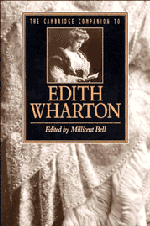Book contents
- Frontmatter
- Introduction
- 1 The Social Subject in The Age of Innocence
- 2 Edith Wharton and the Science of Manners
- 3 Edith Wharton and Race
- 4 The Custom of the Country
- 5 The Female Conscience in Wharton's Shorter Fiction
- 6 Law, Language, and Ritual in Summer
- 7 The House of Mirth
- 8 The Fruit of the Tree
- 9 The Valley of Decision
- 10 Edith Wharton's Valley of Decision
- Bibliography
- Index
- Series List
2 - Edith Wharton and the Science of Manners
Published online by Cambridge University Press: 28 May 2006
- Frontmatter
- Introduction
- 1 The Social Subject in The Age of Innocence
- 2 Edith Wharton and the Science of Manners
- 3 Edith Wharton and Race
- 4 The Custom of the Country
- 5 The Female Conscience in Wharton's Shorter Fiction
- 6 Law, Language, and Ritual in Summer
- 7 The House of Mirth
- 8 The Fruit of the Tree
- 9 The Valley of Decision
- 10 Edith Wharton's Valley of Decision
- Bibliography
- Index
- Series List
Summary
Edith Wharton was present at the famous 1913 debut of Stravinsky's Le Sacre du Printemps when the Parisian ballet patrons erupted in protest at the work's cacophonous sounds and sacrificial themes. She therefore witnessed two ongoing dramas of early modernism: the absorption of primitivism into the high arts, and the outrage it could provoke among the arts establishment. It is not surprising that the cosmopolitan Wharton, by this time a famous expatriate, was on hand for one of the signal events of European art history. But her reputation as a cultural conservative distrustful of avant-garde experimentation offers little to account for her deep admiration of the ballet: her notebook records that she found it “extraordinary”. The gap between reputation and reality here is provocative, for it hints at the complexity of Wharton's relation to her cultural context - and to the changing concept of culture itself, the subject at the heart of her fiction.
Of particular interest is the historical turn to primitivism reflected in both Stravinsky's score and Nijinsky's choreography, for this contemporary trend can also provide an illumination of Wharton's own art. Her intellectual interest in the subject of tribal or “primitive” culture is well known; R. W. B. Lewis writes that she was “passionately addicted” to anthropology from an early age, and it is easy to speculate that her ethnographic knowledge provided much of the pleasure she took in the ballet's harsh ritualism. Like many contemporary artists Wharton had a taste for the exotic. At first glance, though, it may appear that ethnographic themes appear in Wharton's fiction merely as a marker of taste, only one among the hundreds that she records in her novels. Newland
- Type
- Chapter
- Information
- The Cambridge Companion to Edith Wharton , pp. 47 - 67Publisher: Cambridge University PressPrint publication year: 1995
- 7
- Cited by



